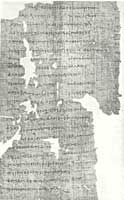|
|
Phaedo, a dialogue of Plato, is a discussion between Socrates and some of his friends on the day of his death. (see also Apology, his statements in court, and Euthyphro) Like a number of philosophers before him, including Anaxagoras, Socrates was charged with impiety for 'not believing in the gods'. He was also brought up on charges of corrupting the young and 'making the worse argument seem the stronger'. This last charge was one which arose largely from a scathing satire "The Clouds", a play written by Aristophanes and performed in 419 BC. Ironically, his execution was delayed by 30 days because of an annual religious ritual. Once a year Athens sent a ship to pay tribute to Delos. During this time, it was customary that no executions should take place. Socrates used that time for philosophical discussions, waiting for the inevitable. While in jail, he discussed philosophy and death, immortality of the soul and life after death. He was a firm believer in reincarnation, a doctrine which Plato likely adopted from his association with Pythagoreans. The two main interlocutors in the Phaedo are Simmias and Cebes, both from Thebes and both Pythagoreans. After drinking the hemlock, Socrates departs to the afterlife with his famous last words, "I owe a cock to Asclepius". Aesclepius was the god of health and healing, and the remark can be seen as a joke upon death being the 'cure' for life.
Literature (german)
An Excerpt from Phaedon, or On the Immortality of the Soul by Moses Mendelssohn (1767) Retrieved from "http://en.wikipedia.org "
 |
|
|||||||||||||||
